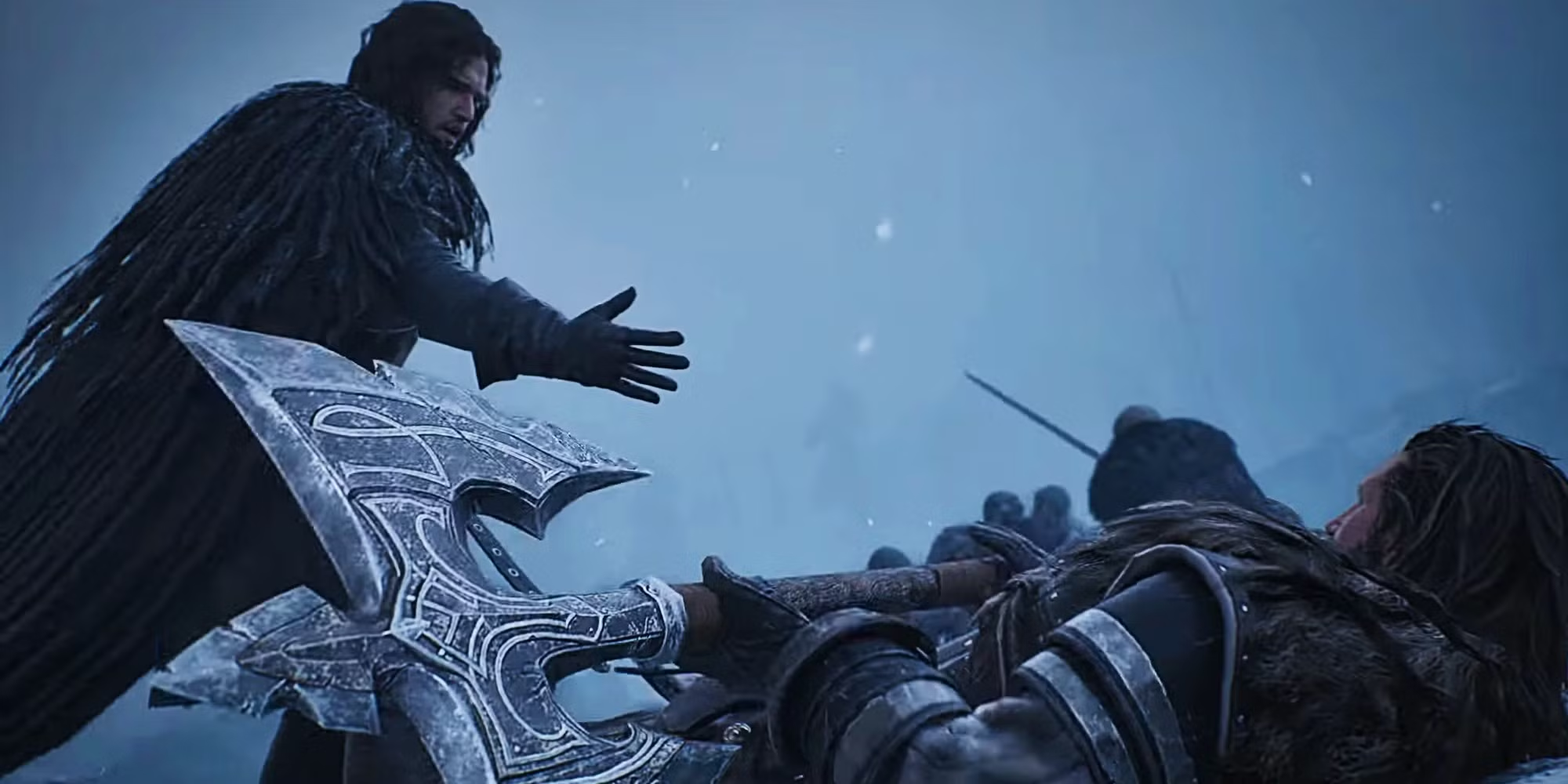In August 2019, just a few months after the polarizing finale of Game of Thrones aired on HBO, showrunners D.B. Weiss and David Benioff inked a $200 million deal with streaming giant Netflix. Their eagerness to move on to other projects was apparent by the end of Thrones’ run, but the stream of new material has come at a trickle so far. The two served as executive producers on 2021’s Sandra Oh-led miniseries The Chair, but the new teen movie Metal Lords is the first taste of post-Thrones writing from either of them since they made the Netflix deal. The duo co-executive produced the film, but the screenplay is a Weiss solo project, based loosely on his own adolescence spent playing in high-school bands. It’s a slight film, and an almost self-consciously low-key follow-up to the massive Game of Thrones, but Weiss has the personal experience to make its humbler ambitions work.
Metal Lords centers on a pair of childhood best friends with a gulf widening between them in their middle teens. Hunter (Adrian Greensmith) constantly bristles against the contours of a world he’s grown to abhor — a dully affluent, overwhelmingly white suburb. His lean, angular frame is a physical echo of his sharp-edged temperament. Kevin (IT and Knives Out’s Jaeden Martell, styled to uncannily resemble a young Steven Wilson of Porcupine Tree) is a gentler presence. He’s mild-mannered and nervous, and frequently gets swallowed up in the wake of Hunter’s bigger personality. But he’s also curious about girls, parties, and everything else his more popular classmates get to enjoy.
Hunter is a dyed-in-the-wool metalhead and a serious guitarist. Kevin doesn’t know much about the music, but he agrees to play drums in Skullfucker, the high-school band Hunter believes will conquer the world. Metal ultimately deepens the bond between the two, but the tension they work through along the way drives the film, and allows for some perceptive observations on what it means to devote yourself to a niche art form.
Photo: Scott Patrick Green/Netflix
Plenty of movies have explored the apparently intrinsic link between social alienation and heavy metal. A foundational film for the pseudo-subgenre was Jim VanBebber’s 1994 short My Sweet Satan, which dramatizes the true-crime story of teen metalhead and murderer Ricky Kasso. Jonas Åkerlund also looked to real life for inspiration for 2018’s Lords of Chaos, documenting the rise of the early ’90s Norwegian black metal scene and the black cloud of church-burning, suicide, and murder that followed its young antiheroes.
The moody, atmospheric 2013 film Metalhead provided something like a photo negative of those films, depicting a grief-stricken young Icelandic woman whose only solace comes from black metal’s lightless void. Lukas Moodysson’s anarchic 2013 feature We Are the Best! — a clear influence on Metal Lords — is steeped in punk, not metal, but it also bestows loud music on its disaffected teen protagonists as an amulet against the conformity of their Swedish hometown. In all these films, heavy guitar riffs and pummeling drums become a lifeline for kids who can’t cope with the world. Something almost supernatural seems to draw them into this cacophonous, confounding music that square society can’t stomach. That describes Metal Lords’ Hunter — but it pointedly doesn’t hold true for Kevin, or for Skullfucker’s eventual third member, the classical-loving cellist Emily (Isis Hainsworth). Metal Lords does its most interesting work in the gaps between its leads’ relationships to the genre.
At the beginning of Metal Lords, Hunter has already sold his soul to metal. His none-more-black wardrobe, the posters on the walls of his rehearsal space, and his knee-jerk rejection of all non-metal music leave no doubt. He’s an archetypal movie metalhead, a kid from a broken home with behavioral issues and an inability to relate to his peers. He channels all his energy into cultivating an encyclopedic knowledge of metal and practicing the guitar. Every headbanger in the audience has had a Hunter in their life.
Photo: Scott Patrick Green/Netflix
Kevin, by contrast, represents a less-documented demographic of metal fan: the enthralled, engaged newcomer. Forget the bullet-belted message-board denizens who say otherwise: No one was born knowing the difference between early- and mid-period Morbid Angel. Every metalhead spent a few dizzying months or years discovering what they loved about this music, and Kevin’s journey in Metal Lords may be the best onscreen depiction of that process yet. The smile that creeps across his lips when he first listens to Black Sabbath’s “War Pigs” – the kickoff song on a playlist Hunter assigns him as homework — captures a magical, indescribable feeling of discovery. The day a metalhead first hears “War Pigs” (or “Master of Puppets,” or “The Number of the Beast”) often ends up feeling like the first day of the rest of their life. Martell’s performance animates that revelatory moment beautifully.
Less convincing is the film’s depiction of Emily, a kind of Metal Pixie Dream Girl who serves as a love interest for Kevin, as well as what Hunter cringingly calls a “Yoko” for Skullfucker. She’s introduced in a scene where she screams at the school’s marching-band director (author Chuck Klosterman) and spikes her clarinet into the turf. When Emily later reveals that she only acted out because she hasn’t been taking her “happy pills,” it’s clear that she’s little more than a girl-shaped pile of clichés. The script doesn’t let the audience in on the precise state of Emily’s mental health, but the way it cavalierly throws in an aside about her medication reveals how little it actually cares. Everything she does in the movie can be excused or explained away by the presence or absence of mood-stabilizing drugs. She seldom seems like a real person.
That’s no discredit to Hainsworth, who gives a quietly powerful performance despite the script’s shortcomings. Emily eventually joins Skullfucker as a cellist, helpfully rechristening the band Skullflower so it can play at their high-school Battle of the Bands. But her interest in metal is both passive and clearly tied to her infatuation with Kevin. Their romance is Netflix-cute, in a To All the Boys I’ve Loved Before kind of way, but the undercooked characterization of Emily gives short shrift to female metalheads, most of whom didn’t need to fall for a boy to understand the power of Judas Priest.
Photo: Scott Patrick Green/Netflix
Metal Lords’ climax comes at that high-school concert, where Skullflower girds themselves against their classmates’ boos and perform “Machinery of Torment,” written by executive producer and Rage Against the Machine guitarist Tom Morello. In School of Rock, another spiritual predecessor to Metal Lords, Jack Black’s Dewey Finn says, “One great rock show can change the world.” Weiss clearly internalized this principle. No matter what happened in the first 90 minutes of Metal Lords, it needed to culminate in a great musical moment. Skullflower delivers on that promise: The young stars’ performance is legitimately awesome, all gawky energy and ear-to-ear grins. The film codes Hunter, Kevin, and Emily as three distinct kinds of metal fans (and musicians), but the power they conjure when they come together is much greater than the sum of its parts.
There’s a bit of “Who is this for?” baked into Metal Lords. Game of Thrones obsessives who check it out to see what Weiss is up to will have to squint hard to find similarities between the two projects, and cranky metalheads will surely find things to gripe about in its sometimes poseurish depiction of their beloved genre. (Counterpoints: Game of Thrones is metal as hell, and metal elitists should just get over themselves already.)
It’s also a teen movie, but the specifics of its subject matter aren’t exactly tuned to a Gen Z frequency. In 2022, classic heavy metal isn’t a 16-year-old’s parents’ music — it’s their grandparents’ music. The central thesis of Metal Lords is that, for those lucky few who respond to metal’s siren song, the experience of falling in love with the genre is an ageless, universal rite. There’s no social currency to be found in metal, particularly in a high school where the only other band plays tepid Ed Sheeran covers to raucous applause. Hunter, Kevin, and Emily embrace it anyway, dedicating themselves to it as fans and musicians. It makes a strong case to any teenager out there who’s interested in pursuing something that nobody they know cares about: Do it anyway.
Metal Lords is now streaming on Netflix.




















![[Book Review] The Blade Itself (The First Law Trilogy) by Joe Abercrombie](https://bendthekneegot.com/wp-content/uploads/2018/01/1516047103_maxresdefault-218x150.jpg)
















